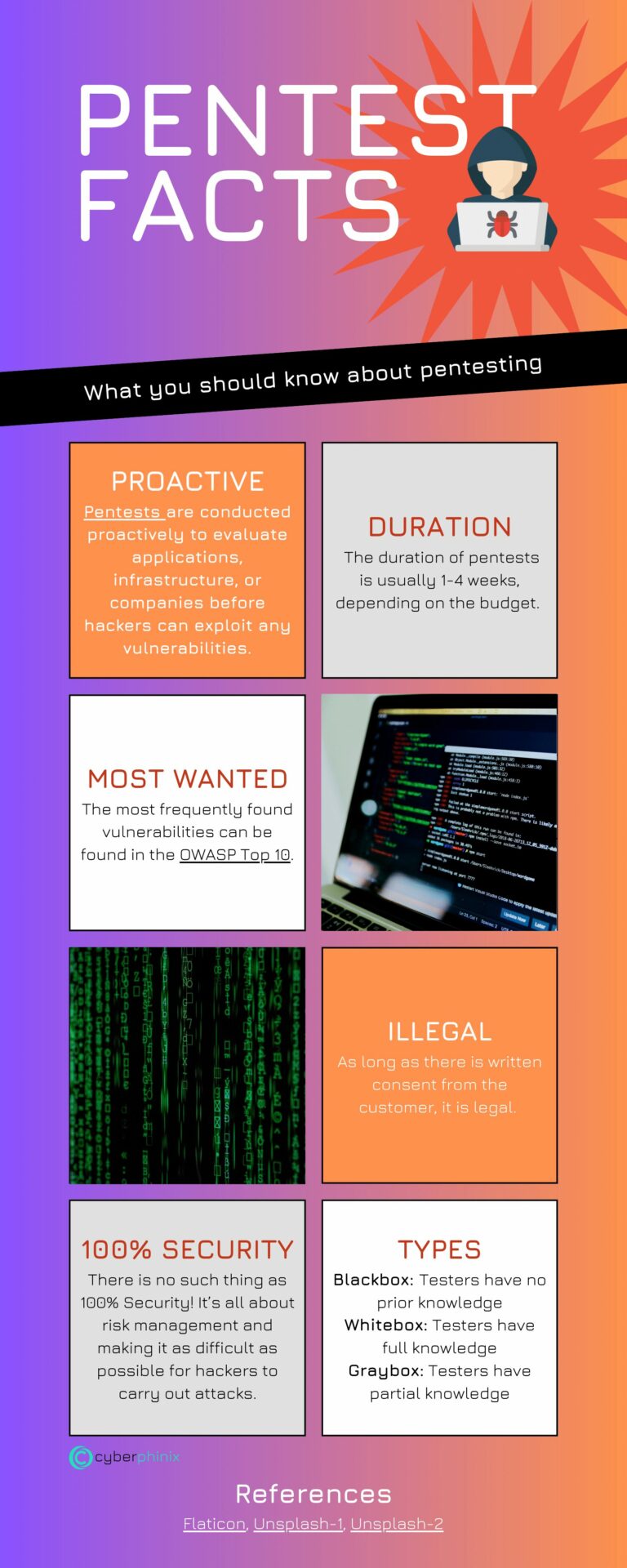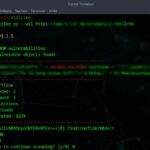If you are interested in IT security and want to put networks, servers and applications through their paces, then a job as a penetration tester could be just the thing for you. But what exactly does a pentester do? And how do you get started in this exciting profession? Get all the answers here!

What is a pentest?

Imagine you’re a hacker, but on the side of the good guys. That’s exactly what a penetration tester does. A pentest is about finding vulnerabilities in a system, network or application before a real attacker does. You take on the role of a hacker and try to break into the system – with the customer’s permission, of course. In this way, you help companies to improve their security.
What does a pentester do?

As a penetration tester, no two days are the same. Your main tasks look something like this:
- Planning and executing attacks: You develop scenarios of how a hacker might attack and then test them in the real world. In doing so, you try to detect as many security vulnerabilities as possible.
- Document the results: After you’ve turned the system upside down, you write a report on what you found and make recommendations on how to close the security gaps.
- Consulting: Depending on the company, you may work closely with their IT teams to help them improve their security.
What should you know before you become a penetration tester?

Before you dive into the world of pentesting, there are a few things you should know:
- Technical knowledge: You should have a solid understanding of networks, operating systems and protocols. Programming skills are also helpful.
- The right mindset: As a pentester, you need to be creative and have stamina. You look for vulnerabilities that no one else has discovered, and this often requires a lot of patience.
- Willingness to learn: The IT security world is constantly changing. You have to be willing to keep learning new things and stay on the ball.
Which certifications help you?

There are several certificates that will help you get started with pentesting:
- eLearnSecurity Web Application Penetration Tester (eWPT): this certificate is a good introduction to learn the basic principles of web pentesting. It also teaches you how to write a pentest report.
- eLearnSecurity Junior Penetration Tester (eJPT): This certificate is a good preparation for the OSCP and is like a watered-down version of the OSCP.
- Offensive Security Certified Professional (OSCP): This certificate is highly regarded in the scene and shows that you really have what it takes.
- Offensive Security Web Expert (OSWE): This certification focuses on web applications – ideal if you want to specialize in this area.
How can I gain practical experience?

Getting started can be challenging, but with the right strategy you’ll get there:
- Network: Attend hacker conferences, join communities and exchange ideas with others. Contacts are worth their weight in gold!
- Practical experience: Use platforms such as Hack-the-Box or TryHackMe to master real hacking challenges. Many companies are looking for people with practical experience.
- Apply: Look around at IT security companies that offer pentests. An internship or entry-level position can pave the way for you. If you are still studying, project work and final theses are very good preparation and can help make it easier to get started.
Common challenges and how to overcome them

As a penetration tester, you’ll encounter some challenges that make the job demanding yet exciting. Here are some common challenges and tips on how to overcome them:
Incomplete Information
Often, you won’t have all the information you need for a pentest. This can be frustrating, but it’s part of the job. Learn to work with incomplete data and improvise when necessary. Use your research skills and OSINT methods to gather additional information.
Time Pressure
Pentests are often time-bound, making it difficult to find all vulnerabilities within the given timeframe. Prioritization is key. Focus first on the most critical systems and vulnerabilities. Work efficiently and manage your time well.
Complex Environments
Corporate networks are often complex, consisting of various systems and technologies. To tackle this challenge, you need to build a broad range of technical knowledge. Stay flexible and open to new tools and techniques that can help you succeed in these complex environments.
Lack of or Outdated Documentation
Systems are often poorly documented, or the documentation is outdated. It helps to approach the task systematically, taking it step by step. Use your ability to think systematically to understand the network’s structure on your own.
Frustration Tolerance
You may spend hours working on a vulnerability without making progress. This is where perseverance comes in. The motto “Try Harder” from the pentesting world is your best friend here. Take regular breaks to clear your mind, and don’t give up!
Soft skills for pentesters

In addition to technical skills, soft skills are essential for a successful penetration tester. Here are some of the most important ones:
Creativity
Pentesters need to be able to think creatively and find unconventional ways to test systems. Every network, server, and application is different, and often you’ll need to come up with creative solutions to uncover security vulnerabilities.
Communication
After a pentest, it’s your job to communicate the results clearly. You must be able to present technical details in a way that both IT experts and non-technical stakeholders can understand. Clarity and precision in your communication are crucial.
Analytical Thinking
A keen eye for detail and the ability to recognize patterns are indispensable in pentesting. You need to be able to analyze complex problems and draw logical conclusions.
Teamwork
Even though you often work alone, teamwork is a key part of the job. You need to collaborate with other security experts, developers, and sometimes management to develop and implement solutions.
Patience and Perseverance
Some vulnerabilities are well hidden, and it can take time to find them. Patience and the ability to keep going even when faced with setbacks are important traits for a successful pentester.
Ethics and Integrity
As a pentester, you have access to sensitive information. It’s crucial that you act ethically and do not betray the trust of your clients. A high level of integrity is essential in this profession.
How do you find a job as a penetration tester?

Before you start your job search, it’s crucial to gain practical experience. Theory is all well and good, but in the world of pentesting, practice is what really counts. Here are some ways to start honing your skills:
- Practice Platforms: There are many online platforms where you can tackle real hacking challenges. Sites like Hack-the-Box, TryHackMe, and VulnHub offer a wide range of tasks that put you in the shoes of a pentester. Here, you can test your abilities without fearing legal consequences. Many successful pentesters took their first steps on these platforms.
- Capture The Flag (CTF) Competitions: CTF competitions are another excellent way to gain practical experience. In these competitions, you solve various cybersecurity challenges to earn points. You not only learn but also get to compete with others and see where you stand.
- Open Source Projects: Contributing to open-source projects is a fantastic opportunity to work on real software projects. You can get involved in security projects or even participate in bug bounties, earning rewards for finding security vulnerabilities in software.
- Labs and Personal Test Environments: Set up your own test environment at home. Install virtual machines with different operating systems and software, and practice hacking in a controlled setting. Tools like Kali Linux offer a collection of hacking tools that you can experiment with.
- Blogs and Tutorials: Read blogs, watch tutorials, or follow cybersecurity influencers on YouTube and Twitter. Many experts share valuable tips and tricks. Plus, you’ll constantly discover new tools and techniques that you can try out right away.
By exploring these options, you can gain practical experience and take your skills to the next level. Practice makes perfect—and that applies to pentesters too! Once you feel ready, you can start looking for a job on job platforms.
Conclusion
Becoming a pentester is no ordinary job – it’s an exciting challenge that requires creativity and technical knowledge. If you are curious, willing to learn and a bit persistent, you can make it in this industry. So, what are you waiting for? Get started and become the next white hat hacker!







